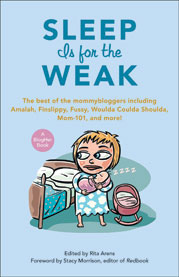G.G. Andrew's Blog, page 14
February 10, 2015
Writers Who Read: Most Romantic Stories
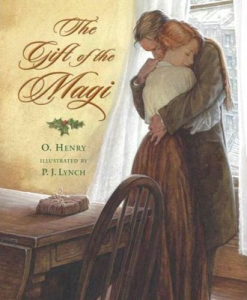 Like on the Halloween post on the scariest stories ever written, I asked the authors participating in the Writers Who Read interview series a question: What’s the most romantic story you’ve read? Here are their answers, from Austen to an experimental science fiction story to Gift of the Magi.
Like on the Halloween post on the scariest stories ever written, I asked the authors participating in the Writers Who Read interview series a question: What’s the most romantic story you’ve read? Here are their answers, from Austen to an experimental science fiction story to Gift of the Magi.
Anna Schumacher, author of End Times
The Gift of the Magi by O. Henry
The Gift of the Magi is so romantic it makes me physically ache. It’s a Christmas story, so apologies for the holiday non-synchronicity, but it’s about being in love, and giving gifts, and making a holiday really romantic and special for your partner, so I think it’s still appropriate for Valentine’s Day.
The story is about a young married couple, Jim and Della, who are basically broke. Between them, they have only two prized possessions: Jim’s gold pocket watch, which has been passed down in his family for generations, and Della’s beautiful long hair, which falls almost to her knees. On Christmas eve, with virtually no money to their names, Jim and Della go on separate hunts for the perfect gifts for one another. I’m honestly not going to re-tell the story, since it’s only six short pages and you can read it in a free PDF with a very pretty font right here, but I can pretty much guarantee that those six pages will make you cry. It’s a simple, gorgeous story about the lengths people will go to for love, and it conveys the often-cloying message that no matter how poor you are, you’re rich if you have love in a way that feels fresh, human, and open-hearted (even if you’re reading it for the 50th time, like I just did).
This story makes me want to find my husband, give him a big kiss and hug, and tell him how much I love him. I hope it has the same effect on you and the people you love!
Pamela DiFrancesco, author of The Devils That Have Come to Stay
“Without Colors” by Italo Calvino
The most romantic story I’ve ever read is “Without Colors” in Italo Calvino’s collection of short stories, Cosmicomics. The collection is very literary and experimental sci-fi, and in the particular story I’m referring to, the protagonist meets and falls in love with a girl in a time before the atmosphere has formed on the earth, and everything is shades of grey. They chase each other through this grey landscape, but as the atmosphere forms, she is frightened and hides away in a crevice, leaving him alone in a world that is vastly more beautiful, without her. It’s heartbreaking, and really contrasts the euphoria and colors of infatuation with those in a vibrant world.
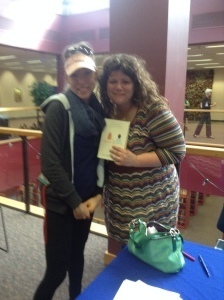
Laura with Eleanor & Park author Rainbow Rowell at a signing.
Laura Madeline Wiseman, author of Drink and other poetry collections
Eleanor & Park by Rainbow Rowell
Last summer, I made a cross-country road trip and a few weeks before I left, I got into the virtual queue for several books I hoped would be ready to download from my local library before my departure date. One of the books was Eleanor & Park, a book that later won the Nebraska Book Award for YA fiction. It was sultry. I started my drives before dawn and ended them well after the glooming, making rest stops at interstate rest areas where I sweated with the engine off and the windows down or sweated as the AC blew hot air, unable to cool in park. But in that swelter, I listened to Rowell’s sweet, poignant love story. Eleanor & Park was this island of cool and delight, the thing that kept me on the road, through the lifting landscape of mountains, the flats of prairie, the slick of moisture and fog on black pavement. I adored it so much that I added it to my book order and taught it last fall in my writing class because it was a story of love, a story set in Omaha, just an hour north of where my students went to school and a place from which many of them hailed, but also because it was written in sparse, evocative prose, a narrative that offered a chance to explore issues of gender, race, and class, against a larger story of love.
Tanya Selvaratnam, author of The Big Lie
The Malady of Death by Marguerite Duras
Marguerite Duras’s The Malady of Death is one of the most anti-romantic, sexually charged stories I’ve ever read. A man offers to pay a woman to stay with him by the sea so he can experience love. Although she is not a prostitute, she accepts. The story is told in a second-person narrative with the man as “you” and the woman as “she,” and by the end the “she” strips the “you” down in more ways than one.

Jenny Vinyl’s Austen flask–a boon to any bookshelf.
Jenny Vinyl
Persuasion by Jane Austen
The most romantic story I’ve ever read will probably always be Persuasion. Jane Austen’s tale has no meet-cutes, awful first impressions, or friends slowly discovering they’re made for each other. Rather, it is the story of what happens long after the lovers have parted. The romance has been requited and has ended. Time has passed. Anne and Captain Wentworth are older, wiser, settled. Readers won’t mistake the regrets and quiet longings for the feverishness of new love, but the romance is there, deeper, tested, and true. Anne still loves Wentworth; there is nothing fleeting about her feelings, which have endured even as she’s held little hope. When they are suddenly and unexpectedly thrown into each other’s company again after eight years, their interactions are as butterfly-making as first loves — more so, because the stakes are higher. We know that Anne and Wentworth belong together; they only parted because of the good, but misguided, intentions of Anne’s friend. As a bonus, Wentworth’s letter to Anne is among the most romantic love letters in all literature: “You pierce my soul. I am half agony, half hope. Tell me not that I am too late, that such precious feelings are gone for ever.” Swoon!
Rebecca Brooks, author of romance Above All
Tana French’s In the Woods
I know, this is a mystery not a romance, and (spoiler) it doesn’t even have a HEA—all of which should make it a terrible choice. But I love how French messes with genre expectations on every page. The developing relationship between Irish detectives Cassie and Rob is so compelling, heartbreaking, and real, it’s impossible not to be swept away by the intensity of their friendship-turned-more. I don’t think I’ve ever rooted so hard for a couple to get together, or been so pissed off when one of them inevitably screws it up. I was seriously invested in this relationship from beginning to end.
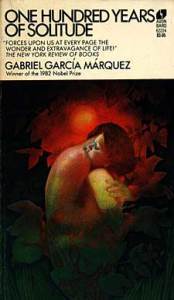 Maureen O’Leary, author of How to Be Manly
Maureen O’Leary, author of How to Be Manly
One Hundred Years of Solitude by Gabriel Garcia Marquez
I was seventeen in my first year of college, arrived at the jungle of UC Santa Cruz via the concrete and green lawns of suburban mid-eighties Northern California. My love education to that point had been informed by John Hughes movies with their one-liners and worship of pink satin, school dances soundtracked by Huey Lewis and the News, and adult warnings to “not get the engine started in the first place.” In the dorms, people poked at one another in rooms that smelled like dirty socks, using one another politely and bloodlessly, as you would ask someone for a tissue or a piece of gum. In this sterile moment, a professor assigned us to read One Hundred Years of Solitude by Gabriel Garcia Marquez.
I read the whole thing in two days, and in one of the final scenes came to this: “It was a fierce fight, a battle to the death, but it seemed to be without violence because it consisted of distorted attacks and ghostly evasions, slow, cautious, solemn, so that during it all there was time for the petunias to bloom and for Gaston to forget about his aviator’s dream in the next room, as if they were two enemy lovers seeking reconciliation at the bottom of an aquarium.”
This was when I learned that nothing less would be possible.
Amanda Gale, author of the Meredith series
A Tale of Two Cities by Charles Dickens
My answer would have to be A Tale of Two Cities. Sydney Carton is so in love with Lucie Manette that he makes the greatest sacrifice of all for her by taking her husband’s place at the guillotine. By doing so without her knowledge, he ensures that she will not bear the burden of making that choice and also that he will not live to receive any recognition or thanks. Most important, though, is the fact that this sacrifice makes him feel that his life was meaningful. He’s spent a lifetime feeling lost and broken; with this act of love, he is redeemed, and he goes to his death confident with the knowledge that he has made Lucie (his “light”) happy.
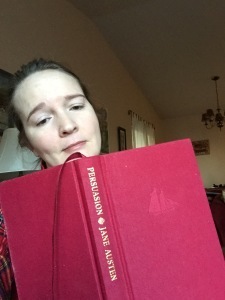
Amy reading Persuasion.
Amy Kathleen Ryan, author of the Sky Chasers trilogy
Persuasion by Jane Austen
I was in my almost mid-thirties, and I hadn’t met my husband yet. I’d more or less resolved that I was going to have to be happy without romantic love, and without a family of my own. I had just sold my first novel, and was working on the next, so I was able to imagine a pretty cool future for myself as a single woman, working as a writer, and dedicating myself to my career. But if I’m honest, I was still pretty bummed out about being alone. Then I discovered Persuasion, by Jane Austen, about a single woman who is getting a bit long in the tooth. (Twenty-eight and unmarried! Perish the thought!) The heroine, Anne, is a quiet sort of person, and though her family is populated by silly people, she has a good head on her shoulders. Her long lost love, a man she’d refused to marry back when she thought she’d get a lot of offers, comes back into the neighborhood, and his presence is by turns agonizing for her and titillating. She is forced daily to confront her profound regret at being persuaded not to marry him because of his poor station in life. The quiet way their love rekindles is one of the most moving depictions I’ve ever read of romantic love, and it made me feel hopeful about second chances. Not long after I read that book, I met the love of my life and married him, and now I’ve got three beautiful daughters. Just like Anne, I got another chance when it seemed too late.
 Tags: A Tale of Two Cities, Above All, Amanda Gale, Amy Kathleen Ryan, Anna Schumacher, Cosmicomics, Drink, Eleanor & Park, End Times, Gift of the Magi, How to Be Manly, In the Woods, Italo Calvino, Jane Austen, Jenny Vinyl, John Hughes, Laura Madeline Wiseman, Margueritte Duras, Maureen O'Leary, Meredith series, mystery, O. Henry, One Hundred Years of Solitude, Pamela DiFrancesco, Persuasion, poetry, Rainbow Rowell, Rebecca Brooks, romantic, rommance, science fiction, Sky Chasers, Tana French, Tanya Selvaratnam, The Big Lie, The Devils That Have Come to Stay, The Malady of Death, Valentine's Day, Without Colors, Writers Who Read
Tags: A Tale of Two Cities, Above All, Amanda Gale, Amy Kathleen Ryan, Anna Schumacher, Cosmicomics, Drink, Eleanor & Park, End Times, Gift of the Magi, How to Be Manly, In the Woods, Italo Calvino, Jane Austen, Jenny Vinyl, John Hughes, Laura Madeline Wiseman, Margueritte Duras, Maureen O'Leary, Meredith series, mystery, O. Henry, One Hundred Years of Solitude, Pamela DiFrancesco, Persuasion, poetry, Rainbow Rowell, Rebecca Brooks, romantic, rommance, science fiction, Sky Chasers, Tana French, Tanya Selvaratnam, The Big Lie, The Devils That Have Come to Stay, The Malady of Death, Valentine's Day, Without Colors, Writers Who ReadDel.icio.us


TweetThis

Digg

StumbleUpon

Comments: 0 (Zero), Be the first to leave a reply!You might be interested in this:
 Jane the Virgin & Writing with Confidence
Jane the Virgin & Writing with Confidence How Do You Choose What to Read?
How Do You Choose What to Read? Writers Who Read: Kristin Fields
Writers Who Read: Kristin Fields Mr. Melty Curried Carrot Concoction
Mr. Melty Curried Carrot Concoction Writers Who Read: Stephanie FeldmanCopyright © G. G. Andrew [Writers Who Read: Most Romantic Stories], All Right Reserved. 2015.
Writers Who Read: Stephanie FeldmanCopyright © G. G. Andrew [Writers Who Read: Most Romantic Stories], All Right Reserved. 2015.February 4, 2015
Writers Who Read: Michalle Gould
The Writers Who Read series continues this week with author Michalle Gould.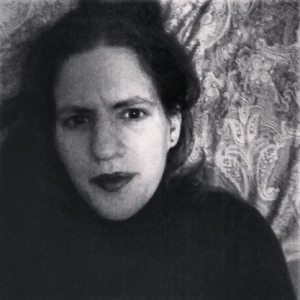
Who are you?
I have been writing and publishing poetry for a long time and received my MFA in 2001 but am just now publishing my first book of poetry. The oldest poems in the book date all the way back to 1999! Many of the poems relate – although in a way that tries to deal with the broader issues relating to religion generally – to my exploration of Orthodox Judaism back in my early to mid twenties, which motivated a move to Manhattan in the summer of 2001 after receiving my MFA. However, that lifestyle was ultimately unsustainable for me, so many of the other poems relate to my experiences trying to figure out what to do afterward, how to retreat gracefully from a world I still cared about and how to find other sources of meaning for myself personally and in my work.
What are three beloved books you first read before the age of 12?
The Witch of Blackbird Pond (Elizabeth George Speare), A Swiftly Tilting Planet (Madeleine L’Engle), and either Where the Red Fern Grows (Wilson Rawls) or Jacob Have I Loved (Katherine Paterson). The last two I love for such different reasons that I can’t choose between them! In general, probably like many writers and passionate readers, I was drawn to stories about outsiders.
What is one book you are always recommending to friends and family (and maybe the local barista) as an adult?
Immortality, by Milan Kundera, and correspondingly his book of essays on writing “Testaments Betrayed.” I love his focus on issues of privacy and threats to privacy, which have only grown more and more relevant in our own social media obsessed society.
What is your book kryptonite–those unique elements in a book, beyond just great writing and three-dimensional characters, that make you unable to resist reading?
I love twins, poetic/lyrical language, and a good (rather than contrived) surprise/twist.
What is your ideal time and place to read?
Late afternoon, on my couch, used to be my favorite when I had a more flexible schedule but now that I work 9-5 again it’s in bed before going to sleep.
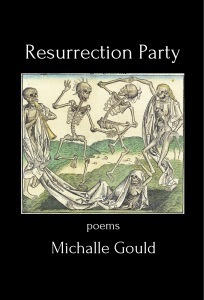 Which books have had the biggest influence on your writing?
Which books have had the biggest influence on your writing?
For poetry, I am more drawn to specific poems/poets than individual books. I would say Eliot, Lucille Clifton, D.H. Lawrence, Zbigniew Herbert. For fiction: Anything by Kundera, Woolf, or generally the British modernist writers between 1900-1950.
How do you balance reading and writing in your life?
Not well enough! When I was younger it didn’t really matter but I’ve slowly become a person who finds it hard to read fiction while I am writing it. I also find it harder to write poetry and fiction at the same time, which never used to trouble me (not literally the same time, but within the same temporal space).
Choose your preferred book form: ebook, physical book, or audio book?
Physical book by far. I don’t mind ebooks but I still like the tangible feeling of turning the pages and also being able to take notes by hand when I am researching a piece.
Do you consciously plan your future reading–i.e., set book goals, keep a TBR list, participate in book challenges or book clubs? Why or why not?
Not really because then it feels like an obligation rather than something I do out of an authentic desire to experience the material. I do record books after I read them though just to have a reference of what I’ve read that year.
You can find out more about Michalle at her website or Twitter. You can also check out Resurrection Party: Poems at Silver Birch Press or Amazon.
 Tags: Jacob Have I Loved, Madeleine L'Engle, MFA, Michalle Gould, Orthodox Judaism, poetry, The Witch of Blackbird Pond, twins, Where the Red Fern Grows, Writers Who Read
Tags: Jacob Have I Loved, Madeleine L'Engle, MFA, Michalle Gould, Orthodox Judaism, poetry, The Witch of Blackbird Pond, twins, Where the Red Fern Grows, Writers Who ReadDel.icio.us


TweetThis

Digg

StumbleUpon

Comments: 0 (Zero), Be the first to leave a reply!You might be interested in this:
 On Writing What People Fear
On Writing What People Fear What Orphan Black Taught Me About Revising
What Orphan Black Taught Me About Revising The Method in the Monster
The Method in the Monster Reading: To Plan or Not to Plan?
Reading: To Plan or Not to Plan?  Weird Writing ResearchCopyright © G. G. Andrew [Writers Who Read: Michalle Gould], All Right Reserved. 2015.
Weird Writing ResearchCopyright © G. G. Andrew [Writers Who Read: Michalle Gould], All Right Reserved. 2015.January 27, 2015
Writers Who Read: Rita Arens
The Writers Who Read series continues this week with Rita Arens.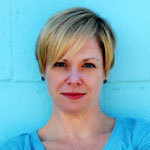
Who are you?
My name is Rita Arens, and I live in Kansas City, Missouri. I’m the author of the contemporary young adult novel THE OBVIOUS GAME and I edited a parenting anthology, SLEEP IS FOR THE WEAK and co-edited a food writing anthology, ROOTS: Where Food Come From and Where It Takes Us. I’m the deputy editor at BlogHer.com and I write the blog Surrender, Dorothy. I’m married and have one daughter.
What are three beloved books you first read before the age of 12?
A WRINKLE IN TIME; THE LION, THE WITCH & THE WARDROBE and WHERE THE RED FERN GROWS.
What is one book you are always recommending to friends and family (and maybe the local barista) as an adult?
CATCH-22, though I realize it’s an acquired taste.
What is your book kryptonite–those unique elements in a book, beyond just great writing and three-dimensional characters, that make you unable to resist reading?
I have an odd affection for unreliable narrators, though I don’t write them myself.
What is your ideal time and place to read?
I’ll read anywhere, any time, but I really like reading outside in a hammock in the early evening.
Which books have had the biggest influence on your writing?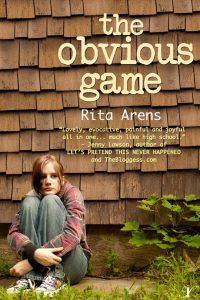
A PRAYER FOR OWEN MEANY; LOOKING FOR ALASKA; ASK THE PASSENGERS; THE BOOK OF JONAS; RULES FOR CIVILITY
How do you balance reading and writing in your life?
I read more when I’m writing less and vice versa, though I do tend to read about a book a week either way. Reading constantly makes my writing better.
Choose your preferred book form: ebook, physical book, or audio book?
I read ebooks faster, but I still do love holding a physical book.
Do you consciously plan your future reading–i.e., set book goals, keep a TBR list, participate in book challenges or book clubs? Why or why not?
I’m very active on Goodreads and had a reading challenge for myself for 70 books in 2014, mostly just to see if I hit that naturally. I wasn’t pushing to achieve it. I’m in one book club at the moment with like-minded friends. I get tons of industry newsletters and have a lot of authors whom I follow, so I’m constantly adding to my TBR list and my library hold list. I do all that because I like to keep up with my favorite authors and because I like to try out different types of stories and TBR lists help me achieve that variety.
What are you reading now?
Right now I’m reading LITTLE BROTHER for my book club, SCARLET with my 10-year-old daughter, and I just started EVERYTHING I NEVER TOLD YOU from my TBR list. And I have a hankering to reread PET SEMETARY and WOOL just because they’ve both crossed my thoughts lately.
You can find out more about Rita on her website, Twitter (@ritaarens), or Goodreads. You can also check out her novel The Obvious Game, and the anthologies Sleep is for the Weak and Roots.
 Tags: A Prayer for Owen Meany, A Wrinkle in Time, BlogHer, C.S. Lewis, Catch-22, ebooks, Goodreads, Kansas City, Little Brother, Looking for Alaska, Pet Sematary, Rita Arens, Rules for Civility, Scarlet, Sleep is For the Weak, TBR, The Obvious Game, Where the Red Fern Grows, Wool, Writers Who Read
Tags: A Prayer for Owen Meany, A Wrinkle in Time, BlogHer, C.S. Lewis, Catch-22, ebooks, Goodreads, Kansas City, Little Brother, Looking for Alaska, Pet Sematary, Rita Arens, Rules for Civility, Scarlet, Sleep is For the Weak, TBR, The Obvious Game, Where the Red Fern Grows, Wool, Writers Who ReadDel.icio.us


TweetThis

Digg

StumbleUpon

Comments: 1 (One) on this itemYou might be interested in this:
 Top 10 Ways to Use Twitter Without Losing Your Soul
Top 10 Ways to Use Twitter Without Losing Your Soul Top Ten Romance Releases in 2014
Top Ten Romance Releases in 2014 Romance Flash Fiction
Romance Flash Fiction Best Winter Romances on Netflix Instant
Best Winter Romances on Netflix Instant Mr. Melty Curried Carrot ConcoctionCopyright © G. G. Andrew [Writers Who Read: Rita Arens], All Right Reserved. 2015.
Mr. Melty Curried Carrot ConcoctionCopyright © G. G. Andrew [Writers Who Read: Rita Arens], All Right Reserved. 2015.January 22, 2015
Best Winter Romances on Netflix Instant
This is a joint post with the lovely Jenny Vinyl.
Winter: nights are long, dark, and cold. When all you want is to wrap up in your Snuggie (™) and hibernate, these winter-esque romances will warm your heart even when the rest of you is shivering. But be warned: like winter, many of these are a little more dark. To help with the shivering darkness, we’ve suggested some hot steaming drinks to enjoy while you swoon.
2 Autumns, 3 Winters
In this movie, people turn to the camera in the middle of the scene and start commenting on what’s happening. It’s French, so I expected some artsy-fartsy stuff like that. Talking heads also narrate, though they are out of the action and a little less jarring. Two of the romantic leads, Arman (Vincent Macaigne) and Amelie (Maud Wyler), literally bump into each other in their meet-cute. But while this is a romantic movie, the stories of Arman and Amelie and their friends deal with some heavy issues having to do with violence and medical emergencies, including a mugging and attempted kidnapping, knifing, stroke, and depression. Small moments, with lots of diversions and digressions, make up this film, which isn’t action-packed. Rather, the characters and their lives are illuminated with little vignettes that are sweet and sad. As the title would suggest, the film contains plenty of winter scenes and also features a chalet with snowy woods and mountains. There are lots of winter coats, heavy sweaters, and girly, chunky scarves on both men and women. If 2 Autumns, 3 Winters is a little too dreamy and philosophical for your taste, just focus on Arman’s hair, which combines a bald spot and comb-over with long-ish locks in the most epic way possible.
Drink: Pair this with mulled wine — warm, yet sophisticated, just like this foreign-language film, and will get you just tipsy enough that you can still read the subtitles.
Chalet Girl
Kim (Felicity Jones) is a champion skateboarder who lost her mother in a car crash and is now, with her father, in reduced circumstances, if not financial straits. While she’s taking care of her apparently inept and unemployed father, she lands a short-term job at a posh ski chalet in the Alps being a “chalet girl” for a rich family with a cute-but-engaged son, Johnny (Ed Westwick). During her few months in the Alps, she meets some cool people, including real-life snowboarding champion Tara Dakides, and grows close to Johnny through her chalet girl duties, and a series of mishaps. She also has time to teach herself snowboarding, which she has a natural knack for, with some local friendly ski bums. Unfortunately, any time she tries to do a big jump, she flashes back to the accident and chokes. Though something of a rags-to-riches tale, this fun little film presents class issues in a more realistic way than I’ve seen portrayed in other rom-coms just aiming to take advantage of a mismatched class couple. Plus, there’s no prince charming rescue here: Kim determines her own life, including entering a snowboarding contest with a hefty grand prize. Be sure to watch through the credits for some fun outtakes.
Drink: Curl up with a spiked hot chocolate for lots of scenes of young debauchery and ski bunny outfits amidst a background of snow-covered mountains.
The Giant Mechanical Man
The Giant Mechanical Man is one of the smartest romances I’ve seen in a while, and definitely has the most likeable leads I’ve encountered in some time. Tim (Chris Messina of The Mindy Project) and Janice (Jenna Fisher from The Office) play two lost and lonely thirtysomethings, unable to fit in with the people around them–who all seem concerned with cars and shallow conversation and upward mobility. Janice is a laid off temp worker who gets a job at the zoo, where she meets Tim, who’s just started working in sanitation. She doesn’t know it, but he’s also the giant mechanical man she’s seen around town–a performance artist in silver makeup and stilts who “makes people feel less lonely.” I’ve had a strange fear of stilts for years, but I still love that quirky addition to the story and Messina’s character, and the opportunity it presents to show the bleak and beautiful winter cityscape. The supporting actors are also great, playing characters that are sometimes unlikeable but nevertheless three-dimensional. And Tim and Janice are emotionally relatable, their difficulties and dialogue feeling achingly real. I rooted for them hard…and was breathless to see the moment that Janice realizes who Tim really is.
Drink: Serve with well-steeped black tea with just a touch of honey to counteract the bitterness. Sip with a side of pie.
Ice Castles
Ice Castles, a remake of a 1970s tearjerker of the same name, follows figure skater Lexi (played by real-life top women’s skater Taylor Firth) as she rises to fame in the skating world. Unfortunately, coached by the tough, controlling Marcus (Henry Czerny), Lexi’s increasing success means her distance and eventual breakup from her steady hockey player boyfriend, Nick (Rob Mayes). The acting of the two leads, Firth and Mayes, feels sweet and genuine here–which is pretty incredible given that Firth has no other acting credits (or so says IMDB), and the other movie I’ve seen Mayes in, John Dies at the End, is about as different from this film as whole milk is to a shot of tequila. In a strange plot twist near the last third of the movie, Lexi has an accident rendering her blind which felt like her “punishment” for her troubles with Nick–despite those troubles stemming from her honestly struggling to handle her fame versus becoming conceited and dismissive. The accident does bring Lexi and Nick back together, though, as he helps her learn to skate without sight. The end hits a nice note of triumph and romance that brings the feels even with the earlier script wobbliness.
Drink: Serve with a wholesome cup of hot apple cidar mixed with your salty tears.
North & South
This BBC miniseries, based on Elizabeth Gaskell’s 19th-century novel, appears dark and dreary. Margaret (Daniela Denby-Ashe) and her family are forced to move from the idyllic south to the industrial north, where life is dependant on the manufacturing industry. Everything is overcast and dirty, and Margaret is stoic, but unhappy. The family befriends Mr. Thornton (Richard Armitage), an owner of one of the cotton mills, though Margaret dislikes him for being gruff and mean, as well as too focused on money and status. As Margaret slowly begins to understand her new town and the people in it, she grows to see beauty in unexpected places and to correct some of her own misunderstandings and assumptions. Fans of Elizabeth and Mr. Darcy will enjoy the relationship between Margaret and Mr. Thornton, though they are far from being Pride and Prejudice knockoffs. The series is infused with observations on class, gender, and consumerism, and the two leads bear that out. Mr. Thornton’s smoldering, brooding appeal is hard-earned by work and socioeconomic sufferings; Margaret is social justice-minded and often outspoken in her attempts to understand and befriend the mill workers. Their friendship, even when adversarial, is marked by the kinds of misunderstandings, missed opportunities, and quiet longings that make hearts swoon.
Drink: Pair North and South with bleak black coffee; stir in some sugar after Margaret meets Thornton.
While You Were Sleeping
This one will likely be a rewatch, but like an old warm afghan, While You Were Sleeping is worth snuggling up and watching again. In the 1995 film, Lucy (Sandra Bullock) gets a chance to save the life of the man she’s in love with from afar, Peter (Peter Gallagher), when he falls on the train tracks. He winds up in a coma, and through a series of misunderstandings that could only happen in a rom-com, his family comes to believe Lucy is Peter’s fiancé. And they’re overjoyed, welcoming the lonely Lucy into their world. But then enters Peter’s brother, Jack (Bill Pullman), who’s suspicious of Lucy even as he finds himself increasingly draw to her. Set around Christmas and the icy January after, it’s got enough of a big, loud family and belly laughs to keep you warm–not to mention the unexpected romance between Lucy and Jack, which Bill Pullman manages to inject with a surprising sexiness. Rewatch to at least remind yourself that sometimes it can be good to slip on the ice.
Drink: Serve with hot cocoa laced with peppermint schappes–warm and comforting, with a kick of something unexpected.
 Tags: 2 Autumns, 3 Winters, apple cidar, Chalet Girl, Chris Messina, hot chocolate, Ice Castles, Jenny Vinyl, John Dies at the End, movies, Netflix, Netflix romances, North and South, romances, romantic comedy, Snuggie, Taylor Firth, The Giant Mechanical Man, While You Were Sleeping, winter
Tags: 2 Autumns, 3 Winters, apple cidar, Chalet Girl, Chris Messina, hot chocolate, Ice Castles, Jenny Vinyl, John Dies at the End, movies, Netflix, Netflix romances, North and South, romances, romantic comedy, Snuggie, Taylor Firth, The Giant Mechanical Man, While You Were Sleeping, winterDel.icio.us


TweetThis

Digg

StumbleUpon

Comments: 0 (Zero), Be the first to leave a reply!You might be interested in this:
 Writing a Subverted Gothic Romance
Writing a Subverted Gothic Romance Writing & Parenting
Writing & Parenting Writers Who Read: Andi Cumbo-Floyd
Writers Who Read: Andi Cumbo-Floyd What Orphan Black Taught Me About RevisingCopyright © G. G. Andrew [Best Winter Romances on Netflix Instant], All Right Reserved. 2015.
What Orphan Black Taught Me About RevisingCopyright © G. G. Andrew [Best Winter Romances on Netflix Instant], All Right Reserved. 2015.January 20, 2015
Writers Who Read: Kristi Belcamino
The Writers Who Read series continues this week with writer Kristi Belcamino.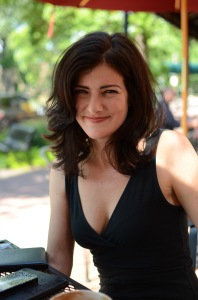
Who are you?
Kristi Belcamino is a writer, photographer, and Italian mama who also bakes a tasty biscotti.
In her former life, as an award-winning crime reporter at newspapers in California, she flew over Big Sur in an FA-18 jet with the Blue Angels, raced a Dodge Viper at Laguna Seca, watched autopsies, and conversed with serial killers.
During her decade covering crime, Belcamino wrote and reported about many high-profile cases including the Laci Peterson murder and Chandra Levy’s disappearance. And because of her police sources, she was one of the first reporters in the country to learn that the passengers on Flight 93 had fought back on 9/11. She has appeared on Inside Edition and local cable television shows. Her work has appeared in such prominent publications as the Miami Herald, San Jose Mercury News, and Chicago Tribune.
Her first novel, BLESSED ARE THE DEAD, was inspired by Belcamino’s dealings on her crime beat with a serial killer who police and FBI agents linked to the kidnapping and murders of little girls.
What are three beloved books you first read before the age of 12?
The Secret of the Seven Crows by Wylie Folk St. John
This is Paris by M. Lasek
The Outsiders by S.E. Hinton
What is one book you are always recommending to friends and family (and maybe the local barista) as an adult?
Peace Like A River by Leif Enger
What is your book kryptonite–those unique elements in a book, beyond just great writing and three-dimensional characters, that make you unable to resist reading?
I like books that show light shining in a dark world.
What is your ideal time and place to read?
In bed at night.
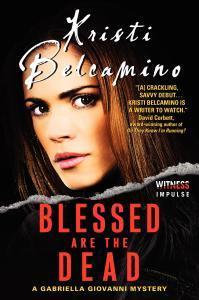 Which books have had the biggest influence on your writing?
Which books have had the biggest influence on your writing?
Lisa Unger’s writing, Hemingway, Ian Fleming
How do you balance reading and writing in your life?
I write from 9 a.m. to noon Monday through Friday.
Choose your preferred book form: ebook, physical book, or audio book?
Physical book
Do you consciously plan your future reading–i.e., set book goals, keep a TBR list, participate in book challenges or book clubs? Why or why not?
No, but I always have a stack of books on my nightstand waiting to be read. A book doesn’t go on any of my bookshelves until it is read.
What are you reading now?
Graduation Day by Joelle Charbonneau
You can find out more about Kristi on her website, Twitter (@kristibelcamino), or Facebook, and you can check out BLESSED ARE THE DEAD at these booksellers:
 Tags: biscotti, Blessed Are The Dead, California, crime reporter, Hemingway, Ian Fleming, Joelle Charbonneau, Kristi Belcamino, Leif Enger, Lisa Unger, Peace Like a River, The Outsiders, The Secret of the Seven Crows, This is Paris, Writers Who Read
Tags: biscotti, Blessed Are The Dead, California, crime reporter, Hemingway, Ian Fleming, Joelle Charbonneau, Kristi Belcamino, Leif Enger, Lisa Unger, Peace Like a River, The Outsiders, The Secret of the Seven Crows, This is Paris, Writers Who ReadDel.icio.us


TweetThis

Digg

StumbleUpon

Comments: 0 (Zero), Be the first to leave a reply!You might be interested in this:
 Where Have the Horror HEAs Gone?
Where Have the Horror HEAs Gone? Writers Who Read: Marly Youmans
Writers Who Read: Marly Youmans Writers Who Read: Kristin Fields
Writers Who Read: Kristin Fields Writers Who Read: Andi Cumbo-Floyd
Writers Who Read: Andi Cumbo-Floyd Manscaping on Book CoversCopyright © G. G. Andrew [Writers Who Read: Kristi Belcamino], All Right Reserved. 2015.
Manscaping on Book CoversCopyright © G. G. Andrew [Writers Who Read: Kristi Belcamino], All Right Reserved. 2015.January 12, 2015
2015 Book Non-resolutions
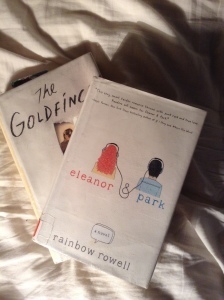 Along with my writing and personal resolutions for the year, I’ve thought about what I want to read in 2015. Although, because often I feel guilt or pressure to read certain books, I’m trying to not commit to any book challenges to keep the joy in my reading. Trying.
Along with my writing and personal resolutions for the year, I’ve thought about what I want to read in 2015. Although, because often I feel guilt or pressure to read certain books, I’m trying to not commit to any book challenges to keep the joy in my reading. Trying.
Still trying.
But there are definitely specific genres, authors, and books I’d like to read this year, and I’m including them below. I’m calling them book non-resolutions, to allow myself slack if I don’t read any of these and instead just read some erotic noir Ghostbusters fanfic or whatever.
Here’s where I’d like my reading to go in 2015:
More Classic Female Authors, More Contemporary Men
Last year 71% of the books I read were penned by women. Though I love supporting women authors, I’d prefer to read closer to a 50/50 author split between genders (or at least 40/60 one way or another). I’ve noticed most of the male authors I read are classic or literary fic guys, and most of the women are contemporary. I’d like to shake that up a bit and read more contemporary male authors, and then more classic female writers. (Edith Wharton, I’m looking at you.)
More Horror and Dark Fantasy
I’ve loved reading supernatural horror from my early teen years when I discovered Stephen King and then mainlined Dean Koontz. I’d love to read more of the scary stuff this year, like King’s Joyland, more Graham Joyce, Kraken, and Horrorstör, because if a ghost story set in an Ikea-like building isn’t the best premise ever, I don’t know what is. I’m set to read House of Leaves and Hell House for book club, too. I’m already on my way here, as right now I’m reading Muriel Gray’s Furnace.
Big Romance Authors I’ve Missed–Especially Historical Romance
I read a lot of romance last year, but it was my first year really binging on it, and I focused mostly on contemporary since this is what I write. I’m embarrassed as a romance author to admit some of the historical romance I haven’t read yet, like Georgette Heyer or Sarah MacLean, who I’ve heard time and time again write fantastic books. I’m at the beginning of a Courtney Milan, and she’s another historical author I’d like to read more. I also need to read contemporary from Susan Elizabeth Phillips, Nora Roberts, and Julie James. I also want to read A Bollywood Affair and a Susan Kearsley novel, because I keep hearing amazing things about both.
Other Books That Bring the Swoon
In 2015 I also want to read more literary and commercial fiction not classified as romance that’s reportedly still romantic, like Lydia Netzer’s How to Tell Toledo from the Night Sky (much recommended by Jenny Vinyl), Rainbow Rowell’s Eleanor and Park (on the nightstand) and her upcoming Carry On, and Crazy Rich Asians.
Parenting Books
I’m quite bad at reading about kids or parenting in my downtime–I’d almost always prefer to read about dragons over babies–but as a special needs parent I recognize I should read a bit more than I do, especially about the experience of people with autism. I’d like to read the ebook of Look Me in the Eye that I bought on sale too many months ago, plus check out Why I Jump and delve into Far From the Tree.
Writing Books
I really enjoy writing craft books, and would like to read a few awesome ones in 2015. I’m tentatively thinking of Syd Field’s Screenplay, K.M. Weiland’s annotated Jane Eyre, and maybe Making a Literary Life, which more than one of the Writers Who Read have enjoyed. Any suggestions from writers out there? I’ve noticed there are a lot of strong opinions on writing books in particular.
What kind of books do you want to read this year?
 Tags: A Bollywood Affair, books, Carry On, Crazy Rich Asians, Dean Koontz, Edith Wharton, Eleanor and Park, erotic noir Ghostbusters fanfic, Far From the Tree, Furnace, Georgette Heyer, Hell House, historical romance, Horrorstor, House of Leaves, Jane Eyre, Jenny Vinyl, K.M. Weiland, Kraken, Look Me in the Eye, Lydia Netzer, Muriel Gray, Rainbow Rowell, reading, Sarah MacLean, Screenplay, Stephen King, Susan Kearsley, Syd Field, Why I Jump, writing
Tags: A Bollywood Affair, books, Carry On, Crazy Rich Asians, Dean Koontz, Edith Wharton, Eleanor and Park, erotic noir Ghostbusters fanfic, Far From the Tree, Furnace, Georgette Heyer, Hell House, historical romance, Horrorstor, House of Leaves, Jane Eyre, Jenny Vinyl, K.M. Weiland, Kraken, Look Me in the Eye, Lydia Netzer, Muriel Gray, Rainbow Rowell, reading, Sarah MacLean, Screenplay, Stephen King, Susan Kearsley, Syd Field, Why I Jump, writingDel.icio.us


TweetThis

Digg

StumbleUpon

Comments: 1 (One) on this itemYou might be interested in this:
 Top Ten Signs You're Reading Literary Fiction
Top Ten Signs You're Reading Literary Fiction Writers Who Read: Amanda Gale
Writers Who Read: Amanda Gale Are You Surprised by the Books that Stay with You?
Are You Surprised by the Books that Stay with You? Writers Who Read: Kelly Ann Jacobson
Writers Who Read: Kelly Ann Jacobson Top Ten Ways to Spot a Rom-Com HeroCopyright © G. G. Andrew [2015 Book Non-resolutions], All Right Reserved. 2015.
Top Ten Ways to Spot a Rom-Com HeroCopyright © G. G. Andrew [2015 Book Non-resolutions], All Right Reserved. 2015.January 6, 2015
Writers Who Read: Andi Cumbo-Floyd
The Writers Who Read series continues this week with author Andi Cumbo-Floyd.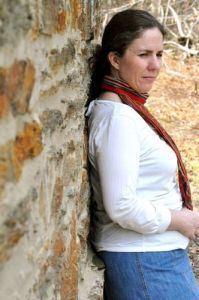
Who are you?
I’m a writer, editor, writing teacher, and farmer who loves to sew, take slow walks, and enjoy my dear friends and family. My husband and I run a small farm in rural Virginia, where we raise goats, chickens, cats, and dogs for the fun of them. When I’m not playing with Great Pyrenees, I write books about the history and legacy of slavery, edit work for clients in a variety of genres, and coach writers at various stages of their writing journeys.
What are three beloved books you first read before the age of 12?
The Lion, the Witch, and The Wardrobe by C. S. Lewis – That book reminded me – still does – that magic is real.
Double Spell by Janet Lunn – I don’t know why this book stuck with me, but it was only a couple of years ago that someone here online helped me find the title.
A Wrinkle in Time by Madeline L’Engle – Oh, Mrs. Whatsit and Charles Wallace – sometimes I think they are two parts of my personality.
What is one book you are always recommending to friends and family (and maybe the local barista) as an adult?
The Woman Upstairs by Claire Messud. Love the honesty of the book. Love that it’s about a woman in early middle age.
What is your book kryptonite–those unique elements in a book, beyond just great writing and three-dimensional characters, that make you unable to resist reading?
I am a total sucker for any book that involves myths and history – The Discovery of Witches by Deborah Harkness is a good example. I also love any story that involves fairy tales or groups of people – particularly women – living in community, as in Toni Morrison’s Paradise.
What is your ideal time and place to read?
I have two – the bathtub in midmorning after I’ve finished the first few hours of work. Then, at night, in bed before I fall asleep.
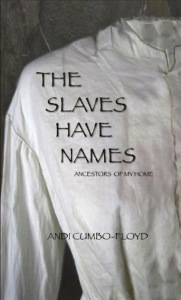 Which books have had the biggest influence on your writing?
Which books have had the biggest influence on your writing?
I’d say Lamott’s Traveling Mercies because I so appreciate her honesty, her vulnerability, and her humor. But then my style is more lyrical, I think, so books like On Looking by Lia Purpura and Seasons of the Body by Brenda Miller are big influences.
How do you balance reading and writing in your life?
I think I must be reading in order to write well, so I try to read 100 pages a day of anything – books, blog posts, magazines – and write 1,000 words. That seems to be a ratio I can fit in most days, and it gives me a goal for each day so that I choose a book instead of my phone.
Choose your preferred book form: ebook, physical book, or audio book?
I read all three, but I definitely prefer print books. I love to see them, feel them, smell them. But I almost always have an audio book in the car, too.
Do you consciously plan your future reading–i.e., set book goals, keep a TBR list, participate in book challenges or book clubs? Why or why not?
In the past, I have done all of those things, but now, I mostly just read what comes to hand next. I do have a reading goal for each year – 2014 was 50 books, and I was just short – and I track that on Goodreads. Sometimes I put books I want to read there, too, but mostly, yeah, it’s what I hear about and then sticks that I move to when I need a new book.
What are you reading now?
I’m in the final third of Susan Cain’s book Quiet: The Power of Introverts in a World that Can’t Stop Talking, and I’m loving it. An introvert myself, the book affirms something central about who I am in the world.
Andi Cumbo-Floyd is a writer, editor, and writing coach. She blogs most days at andilit.com, and you can find her on Facebook and Twitter, too.
 Tags: Andi Cumbo-Floyd, Anne Lamott, audio books, Brenda Miller, C.S. Lewis, Claire Messud, Double Spell, editor, farmer, Goodreads, LIa Purpura, Madeline L'Engle, On Looking, reading, Seasons of the Body, slavery, teacher, The Discovery of Witches, The Woman Upstairs, Toni Morrison, Traveling Mercies, Virginia, Writers Who Read, writing
Tags: Andi Cumbo-Floyd, Anne Lamott, audio books, Brenda Miller, C.S. Lewis, Claire Messud, Double Spell, editor, farmer, Goodreads, LIa Purpura, Madeline L'Engle, On Looking, reading, Seasons of the Body, slavery, teacher, The Discovery of Witches, The Woman Upstairs, Toni Morrison, Traveling Mercies, Virginia, Writers Who Read, writingDel.icio.us


TweetThis

Digg

StumbleUpon

Comments: 0 (Zero), Be the first to leave a reply!You might be interested in this:
 Writers Who Read: Désireé Zamorano
Writers Who Read: Désireé Zamorano How Do You Choose What to Read?
How Do You Choose What to Read? Writers Who Read: Heidi Hutner
Writers Who Read: Heidi Hutner What's Your Book Diet?
What's Your Book Diet? 2014: My Year in BooksCopyright © G. G. Andrew [Writers Who Read: Andi Cumbo-Floyd], All Right Reserved. 2015.
2014: My Year in BooksCopyright © G. G. Andrew [Writers Who Read: Andi Cumbo-Floyd], All Right Reserved. 2015.January 5, 2015
New Year, New Word
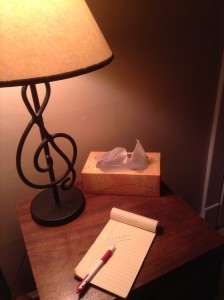 My friend Eva KL Miller reminded me on New Year’s Day that, along with resolutions, she also chooses a mantra word for the year.
My friend Eva KL Miller reminded me on New Year’s Day that, along with resolutions, she also chooses a mantra word for the year.
I had already mapped out my resolutions for 2015, specifying what I wanted to do, how much, and how often, but I hadn’t chosen a word. So, inspired by Eva, I took a look at my resolutions and tried to see what united them.
One theme emerged: connection. This surprised me, given I’m pretty introverted, but so many of my goals for the year are focused on connecting with others. Calling family and friends more. Making an effort to sit down with my kids, both who have special needs, and teaching them together. Blogging here, but also commenting on others’ blogs and tweeting authors when I’m loving a book they’ve written. Even my health goals to eat better and move consciously feel like trying to connect better to my body versus the disconnection and mindless eating that I’ve often experienced in the past.
My writing goals for the year are also focused on connection. I’m aiming to write at least 100,000 fiction words I either submit or publish. I’m one of those writers who has a lot of story ideas, which I often get very excited about right when I’m in the middle of another project. I don’t want to end 2015 with a bunch of half-done stories, so I’m attempting to focus on finishing and connecting my words to readers.
What are your resolutions for 2015? And is there a theme that unites them?
 Tags: 2015, blogging, family, fiction, goals, mantra, New Year's resolutions, special needs, writing
Tags: 2015, blogging, family, fiction, goals, mantra, New Year's resolutions, special needs, writingDel.icio.us


TweetThis

Digg

StumbleUpon

Comments: 1 (One) on this itemYou might be interested in this:
 Writers Who Read: Désireé Zamorano
Writers Who Read: Désireé Zamorano Constantine Cocktail: The Steamed Demon
Constantine Cocktail: The Steamed Demon Girl B Bites It: A Horror Trope That Needs to Die
Girl B Bites It: A Horror Trope That Needs to Die Top Ten Signs You're Reading Genre Fiction
Top Ten Signs You're Reading Genre Fiction Top 10 Ways to Use Twitter Without Losing Your SoulCopyright © G. G. Andrew [New Year, New Word], All Right Reserved. 2015.
Top 10 Ways to Use Twitter Without Losing Your SoulCopyright © G. G. Andrew [New Year, New Word], All Right Reserved. 2015.December 31, 2014
Ten Best Search Terms in 2014
It’s the end of the year, so that means it’s either time to a.) reflect on my life and habits and goals, or b.) laugh about some of the weirder search terms that people used to find this site in the past year. I’m going the latter route.
1. “manscaping book”: this struck me because not just one but two people searched for it. Is there a manscaping guide out there? Should I buy it for my male relatives?
2. “email rich gg”: if such a creature exists, I am not her, so you should direct your Gmail elsewhere.
3. “the magicians land PDF free download” and “read the magicians land for free”: this is not that kind of site. My apologies to all ye mateys.
4. “bloody girl sex”: I can’t even.
5. “melty writing”: sometimes, yes. I’m working on it.
6. “g.g. sex 18 yes”: yikes. And no.
7. “who is belles mom in Christmas Bounty”: I hope you found out because I’m too lazy to look.
8. “gry angrew”: how my name is spelled in the old country.
9. “Jane virgin bouncing breasts”: forget the dudes on the show, this person is squarely on Team Jane.
10. “lady bites b”: this is truly a problem.
Happy New Year!
 Tags:
Tags: Del.icio.us


TweetThis

Digg

StumbleUpon

Comments: 7 comments on this itemYou might be interested in this:
 Creativity is (Mostly) Bullshit
Creativity is (Mostly) Bullshit Writers Who Read: Kassandra Lamb
Writers Who Read: Kassandra Lamb Writers Who Read: Susan Rich
Writers Who Read: Susan Rich What Orphan Black Taught Me About Revising
What Orphan Black Taught Me About Revising Manscaping on Book CoversCopyright © G. G. Andrew [Ten Best Search Terms in 2014], All Right Reserved. 2015.
Manscaping on Book CoversCopyright © G. G. Andrew [Ten Best Search Terms in 2014], All Right Reserved. 2015.December 22, 2014
Writers Who Read: Gill Hoffs
The Writers Who Read series continues this week with the lovely Gill Hoffs.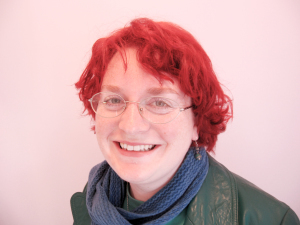
Who are you?
The one, the only, Giiiiiiiiiillllllll Ho-o-o-offfffffs! You’ll have to imagine the drumroll, cymbal clash, and ringmaster’s flourish with a whip. I was raised along the west coast of Scotland and now live in Warrington in the north-west of England with my scientist husband, seven-year-old son, fat cat Coraline and never quite enough chocolate. I’m a vegetarian atheist with a psychology degree, sweet tooth and immense loathing for veg, twelve tattoos including my old dog’s name and a hammerhead shark, dyed red hair, and wonky specs (my son keeps playing with them). I used to work with children with emotional/behavioural difficulties, but now I write and do talks and workshops and generally have a blast with words instead. My short stories, guestblogs and articles are online (see gillhoffs.wordpress.com for links if you want a nosy) and there’s some fiction and nonfiction in print, too, including a story a month in the twelve Pure Slush anthologies that make up “2014: A Year in Stories”. I’ve two books out, “Wild: a collection” (Pure Slush, 2012) which is a mixture of fiction and nonfiction, and more recently “The Sinking of RMS Tayleur: The Lost Story of the ‘Victorian Titanic’” (Pen & Sword, 2014) which is about a shipwreck off the coast of Ireland that I’m somewhat obsessed with. If you’re a descendant of someone involved with the tragedy or know anything about it then please do get in touch. Apart from that if you could keep your fingers crossed for me while my novel, a maritime thriller, is out on submission with agents I’d greatly appreciate it!
What are three beloved books you first read before the age of 12?
“Slugs” by Shaun Hutson, “Riders” by Jilly Cooper, “The Velveteen Rabbit” by Margery Williams. I was quite a precocious reader and sometimes deliberately read a book with a cover (or author) likely to shock the children and adults at school. When you’re unhappy somewhere and getting unpleasant reactions anyway you might as well go for broke and at least have some control over it. For me, quite apart from my love of racy fast-paced and sometimes melancholy reads, the tut-tutting of book-snobs gave an added frisson of excitement to my reading material.
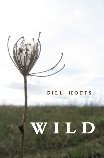 What is one book you are always recommending to friends and family (and maybe the local barista) as an adult?
What is one book you are always recommending to friends and family (and maybe the local barista) as an adult?
“Dancing on Ice: A 1930s Arctic Adventure” by Jeremy Scott to anyone interested in history, nonfiction, atypical love stories and adventure. “Blacklands” by Belinda Bauer (along with the rest of her canon) to folk who like crime/thriller novels. “How To Tell If Your Cat Is Plotting To Kill You” by The Oatmeal to people who want something to make them laugh. I sent Jeremy Scott a fan letter after reading his book – I was that impressed with it – and he very kindly replied. He is every bit as witty and charming as he appears in his autobiography “Fast & Louche: Confessions of a Flagrant Sinner”, which I would also heartily recommend.
What is your book kryptonite–those unique elements in a book, beyond just great writing and three-dimensional characters, that make you unable to resist reading?
I can’t resist gruesome detail, strong plot, and a countryside or maritime setting. I think it was Joss Whedon who said something about how you have to earn the reader/viewer’s relief at a character’s survival in a predictably fatal situation by killing off someone else beforehand, to show the reader/viewer that yes, the writer is willing to go *that* far and no-one is ‘safe’. Anything with drowned villages, secret passages, caves, haunted antiques, or bodies lost in ponds is a must-read too. Recommendations are very welcome!
What is your ideal time and place to read?
Anytime, anywhere, though if I read while moving I tend to feel queasy (boo, hiss). I always read at least a couple of pages (usually a multiple of 9) in bed before I go to sleep – it tends to clear my head of the type of thoughts that seep into my dreams and prey on my generally positive attitude, and the 9 thing is because I like to finish on a page number that adds up to 12 (or, of course, 3). It’s a daft superstition but helpful if my cat, Coraline, knocks my book off the nightstand and I lose my place. Although I have many beautiful bookmarks that I’ve been given over the years, I have a terrible habit of leaving a book open, face-down, to keep my place – I quite like the white creases that develop along a much-read book’s spine. They’re like laughter lines on a face, visible reminders of past enjoyment.
Which books have had the biggest influence on your writing?
Too many to recount! “Mirror” by Graham Masterton, “The Small Assassin” collection by Ray Bradbury, “Sleeping Murder” by Agatha Christie, “The Book of Lost Things” by John Connolly, “Dancing on Ice: A 1930s Arctic Adventure” and “Fast and Louche” by Jeremy Scott, “The Stake” by Richard Laymon, “The Wasp Factory” and “Complicity” by Iain Banks, “Toady” by Mark Morris, the Inspector Lynley mysteries by Elizabeth George, “Stardust” by Neil Gaiman, “The Sad Book” by Michael Rosen, everything by Dick Francis, “Jurassic Park” by Michael Crichton, “The Palace of Curiosities” by Rosie Garland, “Mauve” by Simon Garfield, “Limeys: The Conquest of Scurvy” by David I. Harvie, and absolutely everything by an amazing crime/thriller writer called Belinda Bauer.
How do you balance reading and writing in your life?
Whichever I crave the most, I indulge in. I can have spells of only reading things online, emails, social media and the like then get a sudden desire for a certain book, often one I’ve read before (perhaps a couple of hundred times) and start binge-reading whatever takes my fancy. I do the same with writing unless I have committed to a piece or project or know it’s something I really need to do. Some writers I know worry when they spend time away from writing, in case they don’t return to that creative flow, and there’s a common idea that you must write at least a little every single day – outside of social media, I mean. I don’t necessarily agree, not for every writer, anyway. I have faith in my brain and its tidal nature and trust that sometimes it needs the input of other people’s words in a frenzy, and other times it needs to spit words back out as fast as I can type them or scribble. Forcing the process leads to what I can only equate to a sulky, sullen, resentful teenager in my head rather than the imaginative weirdo I prefer.
Choose your preferred book form: ebook, physical book, or audio book?
Definitely physical, and preferably from roughly the period the book was first published – I find modern editions of the first Agatha Christies and Dick Francis’s jarring and uncomfortable. I like the smell, the feel, the cover, the reassuring weight of it in my pocket – everything about them, especially ancient inscriptions by whoever first bought/gifted it and author signatures. I have an antique book of Robert Burns’ poetry (not that I’m a fan, I’m not, despite growing up close to his cottage) with the beautifully inked message “Presented to:- Robert D. Poplis, by his friend Edward Gibbon Esq. for reciting to him and others “Tam O’Shanter,” April 12th 1888″ – that’s one loooooooong poem – and I’m a sucker for hand-cut pages (especially if the last few are still uncut as I can’t help but wonder if the reader grew weary of the book or died before finishing it), old inscriptions, and doodles or items secreted within pages.
Do you consciously plan your future reading–i.e., set book goals, keep a TBR list, participate in book challenges or book clubs? Why or why not?
Definitely not, everything about that gets my hackles up and makes me remember forced reading at school, which I loathed, especially when we all had to read aloud in turn and I got told off (a LOT) for reading ahead. I understand the usefulness of this for some readers and certainly wouldn’t discourage it but for me, no, absolutely not. I have piles – and I do mean plural, spread across various shelves and tables and areas of carpet – of TBR books, some by friends and acquaintances and label-mates, some gifted by loved ones or picked up in charity shops or on a whim, and sometimes I’ll read something because I *should*, for research or review purposes, but generally I go on instinct, and quite often re-read a favourite comfort book before venturing into new terrain.
What are you reading now?
“The Guillotine Choice” by Michael J. Malone, “Longshot” by Dick Francis, “Shipwreck” by Sam Willis (I tend to have a lot of books on the go at the one time), “The Book of Lost Things” by John Connolly, “Broken Monsters” by Lauren Beukes, and “Mrs Pig’s Bulk Buy” by Mary Rayner and “Haunt: Dead Scared” by Curtis Jobling at my son’s bedtime. I also tend to pinch my husband’s copies of New Scientist. Some of that’s worse than a horror story.
You can find out more about Gill on Twitter (@gillhoffs) or on her website.
 Tags: Agatha Christie, Belinda Bauer, chocolate, Dick Francis, drowned villages, England, Gil Hoffs, hammerhead shark, haunted antiques, Jeremy Scott, Jilly Cooper, Lauren Beukes, Pen & Sword, poetry, Pure Slush, RMS Tayleur, Robert Burns, Scotland, Shaun Hutson, shipwreck, Slugs, The Velveteen Rabbit, Writers Who Read
Tags: Agatha Christie, Belinda Bauer, chocolate, Dick Francis, drowned villages, England, Gil Hoffs, hammerhead shark, haunted antiques, Jeremy Scott, Jilly Cooper, Lauren Beukes, Pen & Sword, poetry, Pure Slush, RMS Tayleur, Robert Burns, Scotland, Shaun Hutson, shipwreck, Slugs, The Velveteen Rabbit, Writers Who ReadDel.icio.us


TweetThis

Digg

StumbleUpon

Comments: 0 (Zero), Be the first to leave a reply!You might be interested in this:
 Writers Who Read: Joyce Thierry Llewellyn
Writers Who Read: Joyce Thierry Llewellyn Writers Who Read: Stephanie Feldman
Writers Who Read: Stephanie Feldman Romance Blurb Drinking Game
Romance Blurb Drinking Game 2014: My Year in Books
2014: My Year in Books How Do You Choose What to Read?Copyright © G. G. Andrew [Writers Who Read: Gill Hoffs], All Right Reserved. 2014.
How Do You Choose What to Read?Copyright © G. G. Andrew [Writers Who Read: Gill Hoffs], All Right Reserved. 2014.
